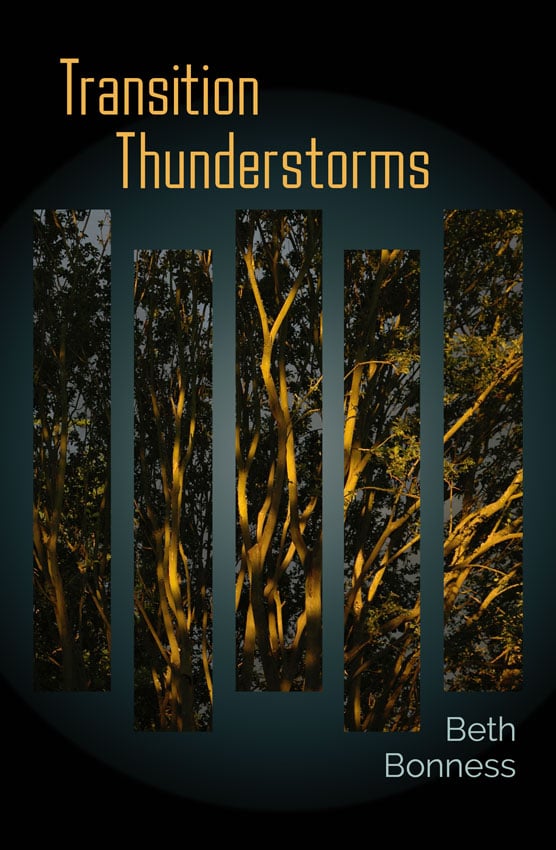
#IndieLitMagGala 2025 Spotlight: Little Thoughts Press
Children’s literature often gets pushed to the side in the “serious” literary world—dismissed as cute, simple, or somehow less worthy of analysis

Beth Bonness’s Transition Thunderstorms (The Poetry Box) doesn’t bother with metaphor when it can hand you the flesh-and-blood reality of neural misfires and collapsing syntax. This modern poetry collection is not for the reader who seeks abstraction or polish. Instead, it drags you, scene by jagged scene, into the raw immediacy of a woman recovering from multiple strokes. The opening poem, wrong word dinner, sets the tone with surgical clarity: “middle daughter points to an apple / i say orange / the word apple mute at the back of my brain.” This is not poeticised confusion. It’s precise, painful, and terrifying in its simplicity. Bonness’s style is stripped back but brutally effective, using broken lines and disjointed pacing to mimic cognitive fracture. It’s not performance. It’s necessity.
Where Bonness excels is in making the clinical feel mythic and the domestic feel like a front line. The recurring thanksgiving with a side of no thank-you series is a blistering narrative thread that captures the surreal banality of hospital life. In #3, the poet observes, “the velcro sleeve / slapped around / my bicep / as i tried / to sleep,” and the line’s breathless fragmentation does more than paint a scene. It enacts the restless limbo of medical surveillance. These aren’t metaphors standing in for something else. This is the poetry of exact experience, delivered in language cracked by real damage. Bonness weaponises white space and silence in ways reminiscent of Anne Boyer and Claudia Rankine. She forces the reader to pause, stutter, and reassemble meaning from the fragments.
The strongest moments in this collection come when Bonness drops into memory with quiet, cinematic precision. In the night she died, the poet recalls watching her father carry the lifeless body of her sister into a police car. “a lace bonnet with blond / curls scotch-taped inside,” she writes, and it’s that unnecessary detail, the Scotch tape, that devastates. It collapses the distance between childlike care and unbearable grief. These aren’t just memories. They are unhealed wounds refracted through a post-stroke consciousness that has no patience for polish. Bonness refuses the tidy arc of recovery or redemption. Instead, she gives us the mess of surviving, not as triumph, but as daily negotiation.
Transition Thunderstorms is anchored in the voice of someone who has been silenced, quite literally, and fought to be heard again. This struggle is perhaps most playfully, yet pointedly, rendered in nose piercing, where the poet’s rebellious spirit reclaims agency in the smallest of bodily acts. “arm-crossed hooligans / watching / high-five each other,” she writes, personifying the chaotic interior voices that cheer her on during a moment of deliberate pain-as-defiance. It’s one of the few pieces where the tone shifts from survival to celebration, and the payoff is well-earned. In less deft hands, this could feel sentimental or manic. Bonness avoids both, threading the moment with dark humour and embodied joy.
Placed in the context of contemporary poetry and independent publishing, Transition Thunderstorms joins the growing lineage of poets who use illness not as metaphor, but as a structural force in their work. Bonness brings a Midwestern sensibility to the page, no fuss, no flinch, but always present. This is a poetry anthology that rejects literary pretence and demands full sensory engagement. For wide readers of contemporary poetry, it’s a reminder that form doesn’t follow function, it follows survival. Bonness doesn’t just write about the storm. She builds her poems to survive inside one.
About the Author

Beth grew up in Wisconsin. She moved to the Northwest with her Computer Science degree and her husband.
Her poems have appeared in Timberline Review, Typehouse Magazine, Friday’s on the Boulevard. She lives in Oregon with her husband and writes early in the morning before she wakes up too much.

Children’s literature often gets pushed to the side in the “serious” literary world—dismissed as cute, simple, or somehow less worthy of analysis

If literary magazines were rock concerts, HAD would be the midnight set you hear about for years. It’s bold, eccentric, and unapologetically

#IndieLitMagGala 2025 Spotlight: Spark to Flame Some journals are built to publish poems. Others are built to make connection happen.Spark to Flame
The Broken Spine is a poetry and arts collective proudly published on the coastal edge of North-West England. Founded in 2019 by Alan Parry and Paul Robert Mullen – two school friends reunited after twenty years through a mutual love of poetry.